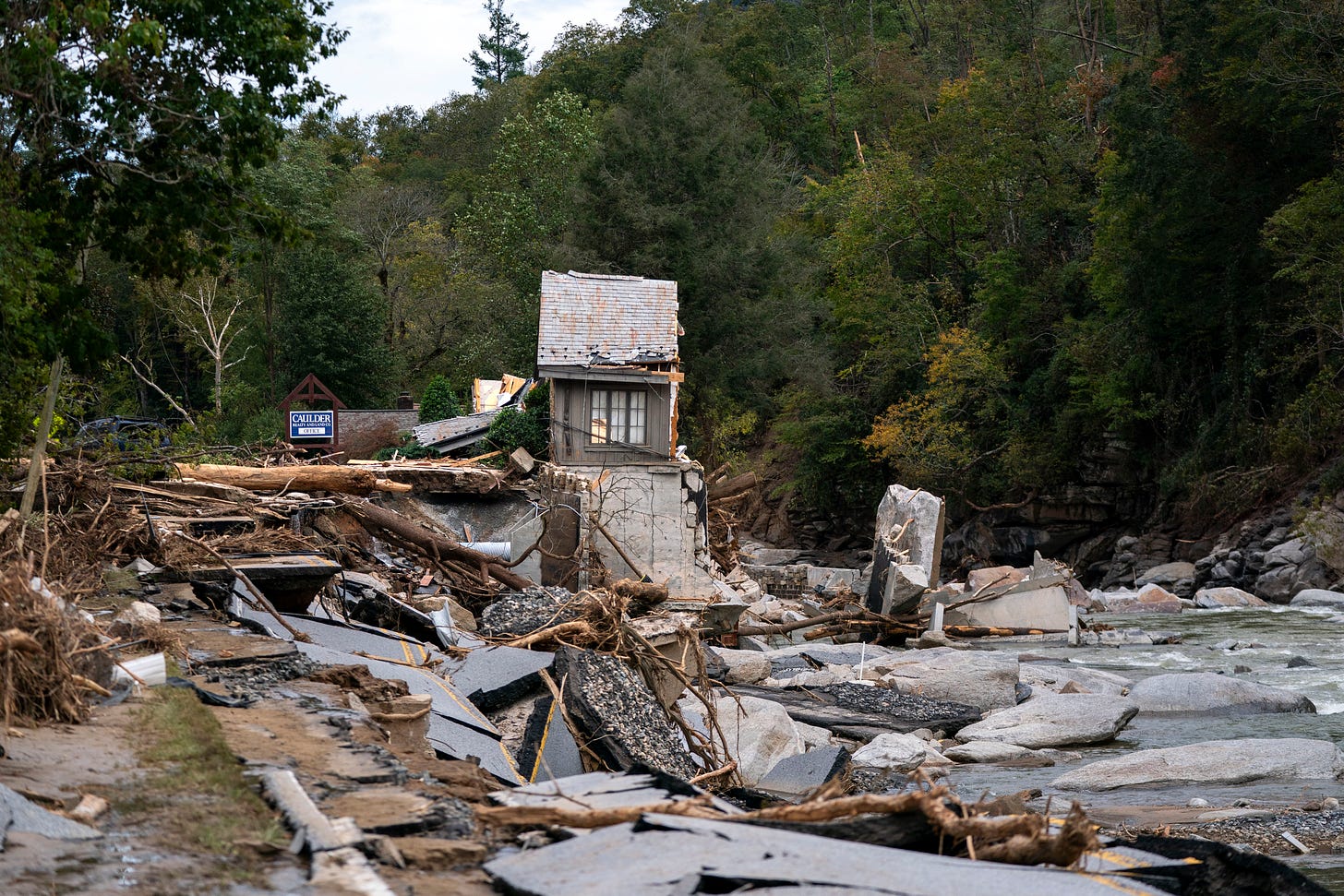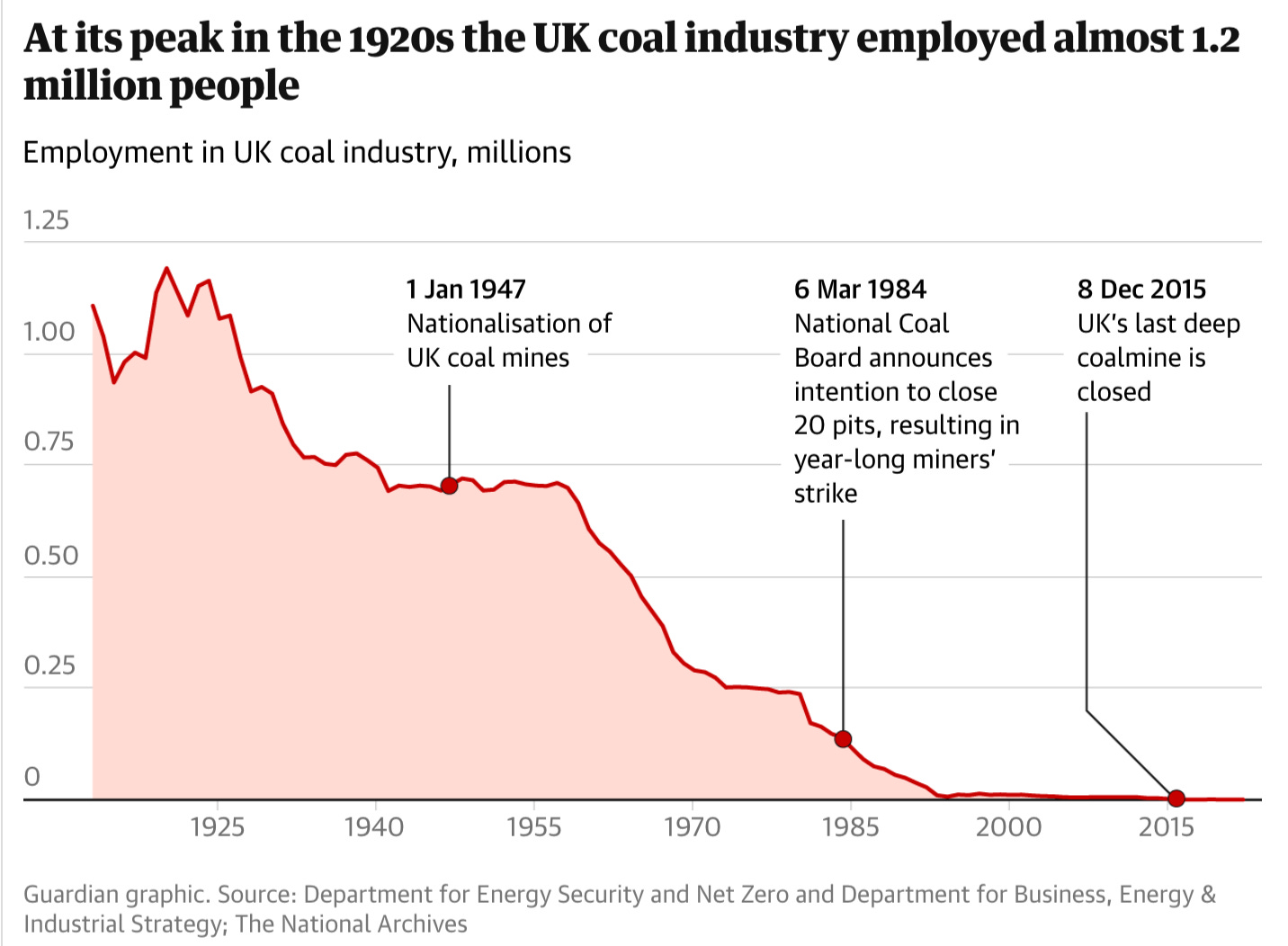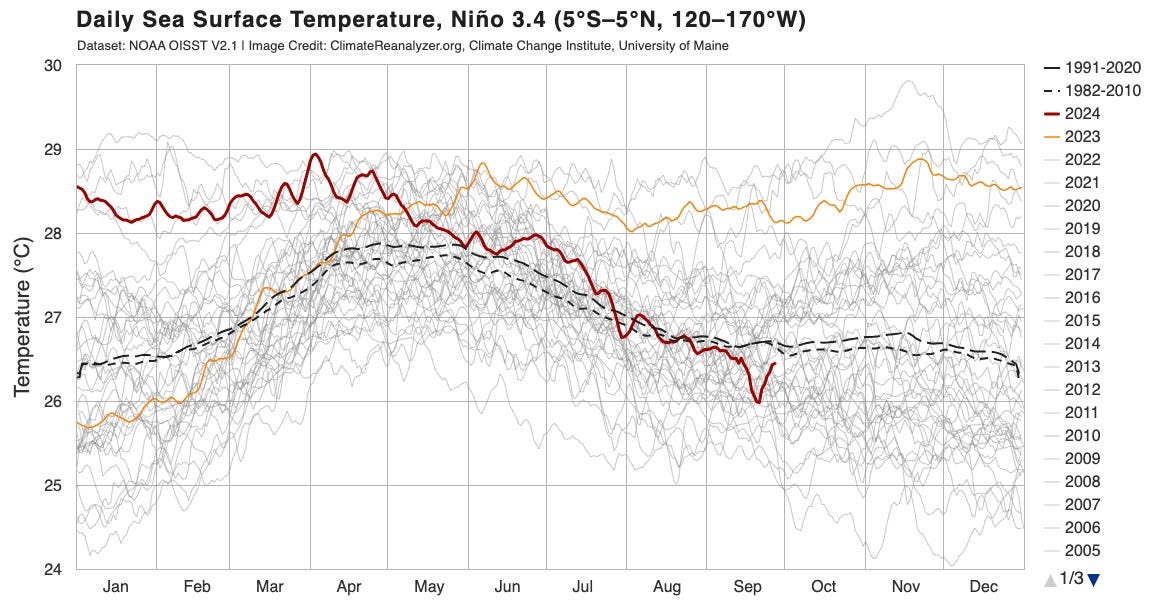Long stories short, here’s the top six news items of note in climate news for Aotearoa this week, and a discussion above between Bernard Hickey and The Kākā’s climate correspondent Cathrine Dyer:
“Why does everywhere seem to be flooding right now, Vox asks, as a new study predicts that 70% of humanity will be hit by extreme weather events within the next 20 years.
Distilled examines insurance retreat as Hurricane Helene wipes out entire communities in states where fewer than 5% of home owners have flood insurance. A 2020 study predicts full insurance retreat from flood-prone coastal properties in Aotearoa’s four main coastal cities within 20 years, with partial retreat occurring within the current decade. Loss of insurance cover can trigger mortgage defaults.
“A child born now will experience 24 times the number of extreme climate events as a politician born in the 1960s.” Tim Winton rails against leaders who collaborate with fossil fuel colonialists, in this Guardian op-ed. He encourages active resistance as a way to restore agency, dignity and health.
Alert to the risk such action poses to their social license to operate, fossil fuel lobbyists have been co-ordinating with lawmakers to enact new laws that apply harsh penalties, including lengthy prison sentences, for peaceful protest.
In the same week that the UK celebrated the closing down of its last coal-fired power plant, the Australian government approved a plan to expand mining operations at three NSW coalmines, a plan that will ultimately generate more than three times Australia’s entire annual emissions.
NASA has produced a set of high-resolution maps depicting coastal and groundwater flooding at the request of Pacific Island countries highly vulnerable to sea-level rise. The analysis shows irreversible sea level rise by 2050 that will now occur regardless of changes to greenhouse gas emissions in coming decades.
(See more detail and analysis below, and in the video and podcast above. Cathrine Dyer’s journalism on climate and the environment is available free to all paying and non-paying subscribers to The Kākā and the public. It is made possible by subscribers signing up to the paid tier to ensure this sort of public interest journalism is fully available in public to read, listen to and share. Cathrine wrote the wrap. Bernard edited it. Lynn copy-edited and illustrated it.)

1. Extreme weather will hit 70% of global population
In the wake of Hurricane Helene, Vox asked ‘why does everywhere seem to be flooding right now?’. Of course, the answer is that climate change is responsible for an increase in all sorts of extreme weather including tropical storms, heavy precipitation, droughts, extreme heat, and wild fires. All are expected to escalate in coming years.
A new study from the Center for International Climate research (CICERO) in Norway predicts that 70% of humans will face extreme weather within the next two decades, with their modelling suggesting that most of this is already locked in.
“"Like people living in a war zone with the constant thumping of bombs and clatter of guns, we are becoming deaf to what should be alarm bells and air-raid sirens," Woodwell Climate Research Center climate scientist Jennifer Francis told Seth Borenstein at the Associated Press, in response to the new Copernicus data.
Iles and team's modelling suggests further extreme weather changes will occur even more rapidly than we have seen so far. This increases the chances that more dangerous extremes in temperatures, rain, and winds could occur in succession or even simultaneously.”
[...] "In the best case, we calculate that rapid changes will affect 1.5 billion people," says physicist Bjørn Samset from the Center for International Climate Research (CICERO) in Norway. This lower estimate would only be reached by dramatically reducing greenhouse gas emissions – something that is yet to occur.” Science Alert
2. Hurricane Helene highlights issue of insurance retreat
The death toll from Hurricane Helene climbed to 160, making it the second deadliest hurricane to hit the US in the last fifty years, after Hurricane Katrina, which killed at least 1,833. Many people remain unaccounted for in the six affected states.
“Scientists found climate change, primarily caused by fossil fuel pollution, exacerbated the severity of Helene. The new findings align with previous scientific research, which has shown that storms are intensifying more quickly and producing more rainfall.” CNN
With drones showing the extent of damage across the six states, early estimates suggest the damage to property and infrastructure will be steep. Unlike other hurricanes, much of the damage occurred inland, where few homeowners have flood insurance.
“For years climate risk experts have been warning that America’s flood insurance system is deeply flawed. According to one of the most advanced modelling efforts conducted by First Street, 6 million homes in the country are at severe risk of flooding and yet are left out of the federal government’s flood risk maps.
The national flood insurance program is also in a deep financial hole. The only way out of it, according to the Congressional Budget Office (CBO) is higher insurance rates or more federal debt. The CBO predicts that flood insurance rates will double over the coming years. Half a million Americans will see their rates rise by more than 300%.
Built in the more stable climate of our past, America’s flood insurance system is cracking at the seams as the world warms. Like much of our infrastructure and institutions, it wasn’t built for a rapidly warming world. “ Distilled
The deep dive in Distilled goes on to examine why floods are the most costly of natural disasters and therefore one of the largest sources of climate risk, and the challenges it poses to insurance provision. In the US, the insurer of last resort is the federal government’s flood insurance program, which relies on inaccurate and outdated flood risk maps that are hiding the true level of climate risk.
In Aotearoa, insurance retreat is already a hot topic. Most residential mortgages require insurance and its withdrawal can trigger default. Insurance retreat modelling conducted by experts from Climate Sigma, Niwa and Te Herenga Waka, Victoria University of Wellington examined four Aotearoa New Zealand cities and estimated that “insurance companies will start retreating from offering full insurance for flood damage in Aoterearoa’s coastal cities within a decade, with full insurance retreat for coastal-flood prone properties occurring within 20-25 years.
“The only intervention that permanently reduces the risk we analysed herein is one of managed retreat — the relocation of at-risk properties away from the escalating risks (Hino et al. 2017).” They note, however, that these are notoriously difficult to implement, with no country having succeeded in designing a systematic programme of voluntary retreat that has had significant uptake.
3. Leaders “collaborating with fossil fuel colonialists”
Tim Winton’s op-ed for The Guardian zeroes in on the buried rage and climate grief affecting young people in particular, suggesting that our current leaders are collaborating with ‘fossil fuel colonialists’.
“If young people feel they’ve been conspired against, it’s because that’s exactly what’s happened. The numbers are in. A child born now will experience 24 times the number of extreme climate events as a politician born in the 1960s.”
Drawing on the experience of Algerian resistance to French colonial power, he suggests that the act of resistance can restore agency, dignity and health.
“What prosperous, educated westerners are experiencing is a form of paralysis, a shutting down and closing off. Frantz Fanon described something similar in Algeria in the 1950s when he observed “the tense immobility of the dominated society”.”
However, protecting the status quo is energising politicians who are busy drafting laws designed to constrain peaceful protest, restrict legal avenues and ensure that fossil fuel developments are able to progress along a smooth path.
4. ‘Lock ‘em up’: Anti-protest laws fuelled by oil lobby
A months-long investigation by the Guardian has uncovered evidence of fossil fuel interests coordinating with lawmakers to develop new laws that expose peaceful protesters to harsh legal penalties, including lengthy prison sentences.
“Records obtained by the Guardian show that lobbyists working for major North American oil and gas companies were key architects of anti-protest laws that increase penalties and could lead to non-violent environmental and climate activists being imprisoned up to 10 years.
Emails between fossil fuel lobbyists and lawmakers in Utah, West Virginia, Idaho and Ohio suggest a nationwide strategy to deter people frustrated by government failure to tackle the climate crisis from peacefully disrupting the expansion of fossil fuel infrastructure by enacting tough laws with lengthy jail sentences.
‘Draft bill attached,’ wrote a lobbyist representing two influential fossil fuel trade groups to the lead counsel for the West Virginia state energy committee in January 2020.”
Protestors in the UK have recently been handed lengthy prison sentences simply for being involved in organising disruptive protests, including four years given to 22-year-old climate protestor Cressie Gethin. Her crime was helping to organise a protest against new government licenses granted to oil companies to drill for oil in the North Sea.
A study by Climate Rights International claims that rich countries are preaching about rights elsewhere while they act to silence climate protestors. The report ‘On Thin Ice: The Disproportionate Responses to climate Change Protesters in Democratic Countries’, documents the increasingly heavy-handed treatment of climate protests in Australia, Germany, France, the Netherlands, New Zealand, Sweden, the United Kingdom, and the United States. The report demonstrates how, in cracking down on climate activists, governments are violating their legal commitments to protect basic rights to freedom of expression, assembly, and association.”
5. Australian mine “immoral & unacceptable” says Tuvalu
In the same week that the UK celebrated the closing down of its last coal-fired power plant, the Australian government approved a plan to expand mining operations at three NSW coalmines.
“The shutdown of the 57-year-old power plant on Monday ends more than 140 years of coal power generation in the UK – an industrial story closely interwoven with Britain’s socioeconomic and political history.
Between the point when Britain’s first coal power plant began generating in 1882 until Ratcliffe’s closure, the UK’s coal plants burned through 4.6bn tonnes of coal and emitted 10.4bn tonnes of carbon dioxide, according to analysts at Carbon Brief, more than most countries have ever produced from all fossil fuel sources.” Guardian
The closing of the plant in Ratcliffe-on-Soar in Nottinghamshire marks a very swift transition away from a form of power that produced 80% of the country’s electricity in the early 1980’s.
Source: Guardian
In the same week, in a move deemed “immoral and unacceptable” by Tuvalu’s climate minister, the Australian Government approved expansion plans for three coalmines in NSW. The three mines are expected to produce more than 1.3bn tonnes of greenhouse gas (GHG) emissions over the next 24 years, an amount that is three times Australia’s entire annual GHG emissions, according to the Guardian who also produced this excellent graphic.
6. Islands face irreversible sea level rise, says NASA
A team of sea level change experts at NASA undertook analysis of the Pacfic region at the request of several Pacific Island nations including Tuvalu and Kiribati, in coordination with the US State Department, to help them with mitigation planning.
“In the next 30 years, Pacific Island nations such as Tuvalu, Kiribati, and Fiji will experience at least 6 inches (15 centimeters) of sea level rise, according to an analysis by NASA’s sea level change science team. This amount of rise will occur regardless of whether greenhouse gas emissions change in the coming years.”
The agency released a set of high-resolution maps showing where Pacific Island nations are vulnerable to high-tide flooding by the 2050’s, with mapping of further island nations to be progressively added. The maps visualise the risks of both oceanic flooding and groundwater flooding.
Chart of the Week: Waiting on La Niña
Sea surface temperatures in the ENSO (El Niño Southern Oscillation) zone are hovering around normal, but a weak La Niña is still odds on to form this spring.
Climate change coming for your coffee, and other news:
Up to 50% of land suitable for growing coffee will be lost by 2050 due to climate change, with small farmers forced to abandon coffee cultivation. The decrease in supply coincides with increasing demand, so expect prices to soar in coming decades. As is the case with chocolate, this threatens livelihoods and economies, in addition to our daily cup of caffeine fix.
The Parliamentary Commissioner for the Environment’s submission on the Crown Minerals Bill notes that reversing the ban “risks our international reputation and relationships”, is “promoting more environmental damage” and, without amendments to decommissioning rules, risks burdening taxpayers with clean-up costs. They also note the “extremely short time-frame for consultation” of just four days constraining fuller analysis. Here is climate and ETS expert Christina Hood’s submission too.
Melting glaciers have forced Switzerland and Italy to redraw their Alpine border due to land form changes beneath the Matterhorn.
Ka kite ano
Bernard and Cathrine



















Share this post